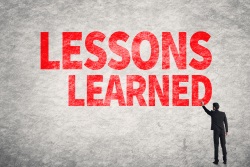9 lessons from elite pistol shooting, and how to apply them to you.
I have had the privilege of working with the GB Pistol Shooting team since September 2011, and have attended two prestigious events (the European Championships in Finland and the World Cup in London). Based on many conversations with UK and overseas elite coaches, athletes and officials, here are some of the unexpected learnings I have gained, and how they could be applied to all of us.
1. Think of sport as a way to learn about yourself as a person, and to develop as a person. Whether you are a novice or an elite athlete, sport can teach you how to:

- handle high levels of pressure
- overcome powerful feelings of anger/frustration/upset (and help identify their source to better handle them in the future)
- work effectively in a team
- focus intensely on the task at hand
- successfully overcome disappointments
2. Break tasks down into bite-size chunks. For example, in air-pistol shooting, there are 40 shots for women, 60 for men. The highest score is 10. Going into the event focussing on all 40 or 60 shots may lead to overwhelm. Focussing on one shot at a time helps relieve pressure, and keeps you ‘in the present’. Running a big work project is just the same – eating an elephant one mouthful at a time.
3. Following on from the above point, create games within games. Whether it’s to score 38 out of 40 ten times when shooting, or to see how many emails you can deal with in the next 30 minutes, making a game of certain tasks can alleviate the ‘pressure’ or ‘boredom’, and add a lightness to events.
4. Even if things don’t go well in a particular match, it’s not the end of the world. It is important to be able to step back and get a different, overall perspective. There is no failure, only feedback!
5. If what you are doing is going off track, stop and take stock, and if appropriate, make adjustments. A European pistol shooter scored three consecutive ‘9’s (which is poor by elite standards). He sat down for 15 minutes (of the allotted 105 minutes) and analysed mentally all three shots to see what he could change. He made the changes, and in his mind started the competition afresh. He went on to win a silver medal.
6. It is important to train at a high level of physical and mental intensity/pressure, so that you are fully prepared for the actual competition or event. This can be applied in the workplace, for example, if you are going for an interview or pitching for business, ask friends or colleagues to give you a ‘grilling’.
7. Remember to mentally rehearse a variety of situations, including challenging scenarios, and to ‘see’ yourself ‘winning’ or performing well each time. This applies to sport and life (e.g. interviews, meetings, dates).
8. Athletes need to be able to solve their own problems, and not rely too much on the coach. This helps them grow and develop resilience and self-reliance. This equally applies in the workplace – effective managers will not always feed their staff the answer, but ask questions so that staff can learn for themselves.
9. Many shooters will have negative thoughts during a competition. Recognise that negative thoughts are just negative thoughts. Notice them if they appear, and let them pass. If you fight having the thoughts, the thoughts will have you! (“What you resist persists”).






